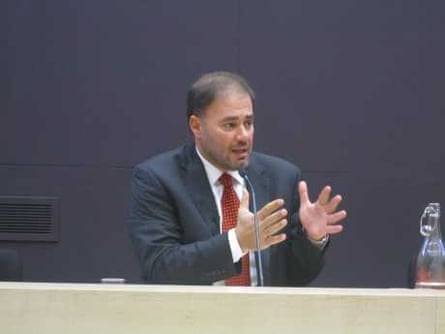
The revolutionary fervour of the Arab Spring came alive last night at City University London in a lecture by Wadah Khanfar, the former director general of Al-Jazeera.
In describing his reaction to the various uprisings, particularly in Egypt and Libya, he illustrated just what is meant by a journalism of attachment or commitment.
Exhibiting an unashamed passion throughout his talk, he told a packed audience:
"In our search for a fixed pivotal point around which our editorial mission is centred we find nothing better than the people with their collective mind and their instinctive opposition to oppression, arbitrariness and corruption...
I learned from my experience as a reporter, and then as director of a media institution, an important basic fact: that we should always posit people at the centre of our editorial policy.
I don't say this simply to reiterate a beautiful slogan with which we decorate our literature or market our institutions. I truly believe this to be a moral commitment, a scientific approach and an essential interest."
Khanfar, the first non-Western journalist to deliver the James Cameron memorial lecture, cast Al-Jazeera's journalism as a sort of democratic mission.
He told how the Egyptian regime's early response to the gatherings in Tahrir Square was to close down the network's offices and to ban its reporters and crews from working.
So the broadcaster sent a message to its Egyptian viewers telling them: "If the authorities have banned our reporters from working, then every single one of you is an Al-Jazeera reporter."
That led, he said, to hundreds of activists supplying the network with a stream of news and video clips via social network sites.
"We succeeded in breaking the siege imposed by the Egyptian security apparatuses, thanks to the faith our viewers had in our mission and to our faith in their capabilities," said Khanfar.
He detailed how the Al-Jazeera staff worked non-stop during the weeks before Hosni Mubarak was forced to step down.
Both the Egyptian and Libyan authorities managed to jam Al-Jazeera's main satellite transmissions until the broadcaster found an alternative.
Khanfar and his Al-Jazeera editorial staff clearly identified with "the masses". He said of Mubarak's resignation: "Undoubtedly, that was a moment in my life I would never forget. I laboured to restrain myself and maintain calmness. Yet, my colleagues inside the newsroom erupted in excitement embracing each other; some even could not withhold their tears of joy."
In a key moment in the lecture, he said:
"We should acknowledge that in the media we shoulder a mission, which journalists should remain aware of as they perform.
This mission is about serving the public interest without bias for one particular opinion or party or current or ideology.
Without such a noble mission, our profession could easily become a commodity on sale. Without it, journalists would never qualify to speak for the public interest and the people would never trust us.
They simply need to see us favour them when it comes to power and authority. In fact, people of power and influence would pay no attention to a media that is not brave and straightforward."
He also spoke of what he called a "journalism of depth", explaining it involves being "the collective conscience of the masses". He continued:
"Experience has proven that the masses as a whole are more aware than the political and intellectual elite; they are shrewd, highly politicised and possess an instinctive insight that enables them to discern good from bad...
The journalism of depth is one that considers the people to be the centre of its editorial policy; it seeks to give the masses a voice and a platform.
It should be courageous and be prepared to withstand so much pressure by disaffected centres of power. The moment it maintains its position and insists on its policy, the people will rally around it.
Then and only then, the people will restore confidence in the media and offer it their support, appreciation and respect."
Khanfar, who spent eight years with Al-Jazeera, suddenly announced that he was resigning on 20 September.
He said he spent his last week in the job visiting Tripoli and Misrata and was delighted by the reception from the people he met in the liberated cities.
He also spoke about the "new positive spirit" generated by new media, which he "would rather call the peoples' media".
He said: "The world of the internet, peoples' media, social network sites, WikiLeaks and others, has undermined the ability of the centres of power to monopolise what is presented to public opinion."
In a question-and-answer session following his lecture, he was asked whether Al-Jazeera would continue to be as good under his replacement as director-general, Sheikh Ahmed bin Jassim Al Thani, a member of the Qatar's ruling dynasty.
Diplomatically, he said he thought it would. The Qatari royal family have funded the broadcaster since its launch in 1996.
Comments (…)
Sign in or create your Guardian account to join the discussion